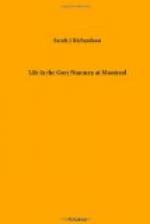“At the end of a month, he succeeded in obtaining another audience, and added to his former confessions what he had remembered, for the first time, touching the Inquisition. But they told him that that was not what they wanted, and sent him back again. This was intolerable. In a frenzy of despair he determined to commit suicide, if possible. Feigning sickness, be obtained a physician who treated him for a fever, and ordered him to be bled. Never calmed by any treatment of the physician, blood-letting was repeated often, and each time he untied the bandage, when left alone, hoping to die from loss of blood, but death fled from him. A humane Franciscan came to confess him, and, hearing his tale of misery, gave him kind words, asked permission to divulge his attempt at self-destruction to the inquisitor, procured him a mitigation of solitude by the presence of a fellow-prisoner, a negro, accused of magic; but, after five months, the negro was removed, and his mind, broken with suffering, could no longer bear up under the aggravated load. By an effort of desperate ingenuity he almost succeeded in committing suicide, and a jailer found him weltering in his blood and insensible. Having restored him by cordials, and bound up his wounds, they carried him into the presence of the inquisitor once more; where he lay on the floor, being unable to sit, heard bitter reproaches, had his limbs confined in irons, and was thus carried back to a punishment that seemed more terrible than death. In fetters he became so furious, that they found it necessary to take them off, and, from that time, his examinations assumed another character, as he defended his positions with citations from the Council of Trent, and with some passages of scripture, which he explained in the most Romish sense, discovering a depth of ignorance in Don Fernando that was truly surprising. That ‘grand Inquisitor,’ had never heard the passage which Dellon quoted to prove the doctrine of baptismal regeneration, ’Except a man be born of water and of the Spirit, he cannot enter into the kingdom of God.’ Neither did he know anything of that famous passage in the twenty-fifth session of the Council of Trent, which declares that images are only to be reverenced on account of the persons whom they represent. He called for a Bible, and for the acts of the council, and was evidently surprised when he found them where Dellon told him they might be seen.
“The time for a general auto drew near. During the months of November and December, 1675, he heard every morning the cries of persons under torture, and afterwards saw many of them, both men and women, lame and distorted by the rack. On Sunday January 11th, 1676, he was surprised by the jailer refusing to receive his linen to be washed—Sunday being washing-day in the ‘holy house.’ While perplexing himself to think what that could mean, the cathedral bells rang for vespers, and then, contrary to custom, rang again for matins. He could only




